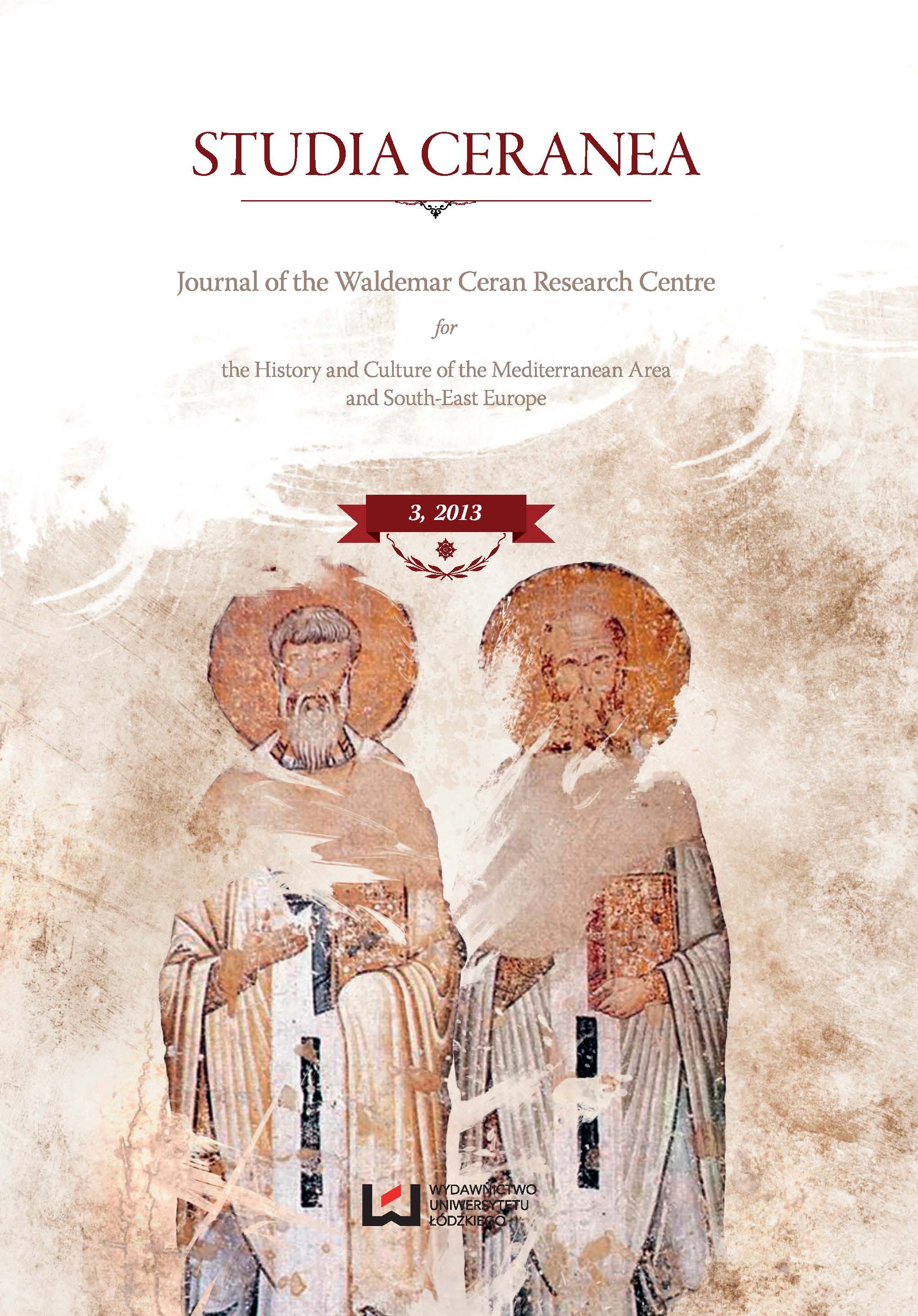"Eparchikon biblion" V, 2: Is Thalassai the Same as Byssos?
DOI:
https://doi.org/10.18778/2084-140X.03.03Abstract
The article examines a kind of fabric described as ‘θάλασσαι’ in The Book of the Prefect (Τὸ ἐπαρχικὸν βιβλίον). The meaning of this term by both editors and commentators of the document has not been satisfactorily explained so far. It appears highly probable, however, that ‘θάλασσαι’, because of the ‘marine’ origin of the word, can be associated with a textile from byssos – the socalled sea silk, made from fibres produced by a mollusc pinna nobilis. The presence of this fabric in numerous ancient sources is indicated, incl. works of Aristophanes, Cicero, Herodotus and Plutarch. Diocletian’s Edict on Maximum Prices, where the price of ‘marine wool’ is at the very high level is also investigated.
Downloads
References
Maniatis G.B., Organization, Market Structure, and Modus Operandi of the Private Silk Industry in the Tenth-Century Byzantium, „Dumbarton Oaks Papers” 53, 1999, p. 263–332.
Google Scholar
Das Eparchenbuch Leons der Weisen, ed. J. Koder, Wien 1991.
Google Scholar
Kολιας T., Χρόνη-Βακαλοπούλου M., Το επάγγελμα και η ονομασία των βόθρων στο Επαρχικόν βιβλίον του Λέοντος Στ΄ του Σοφού, „Ἐπετηρὶς Ἑταιρείας Bυζαντινῶν Σπουδῶν” 52, 2006, p. 379–390.
Google Scholar
Koder J., “Wer andern eine Grube gräbt...” Die Bezeichnung βόθρος in „Eparchikon biblion”, [in:] Fest und Alltag in Byzanz, hrsg. G. Prinzing, D. Simon, München 1990, p. 71–76.
Google Scholar
Сюзюмов М.Я., Византинская книга Эпарха, Москва 1962.
Google Scholar
Kολιας T., Χρόνη M., Τὸ ἐπαρχικὸν βιβλίον Λέοντος τοῦ Σοφοῦ, Αθήνα 2011.
Google Scholar
Laufer B., The Story of the Pinna and the Syrian Lamb, „Journal of American Folklore” 28(108), 1915, p. 103–128.
Google Scholar
McKinley D., Pinna and Her Silken Beard: a Foray into Historical Misappropriations, „Ars Textrina: the Art of Weaving” 29, 1998, p. 9–223.
Google Scholar
Maeder F., Halbeisen M., Muschelseide: auf der Suche nach einem vergessenen Material, „Waffen- und Kostümkunde” 1, 2001, p. 33–41.
Google Scholar
Maeder F., Sea-silk in Aquincum: First Production Proof in Antiquity, [in:] Vestidos, Textiles y Tintes. Estudios sobre la produccion de bienes de consumo en la Antiguedad. Actas del II Symposium Internacional sobre Textiles y Tintes del Mediterraneo en el Mundo antiguo (Atenas, 24 al 26 de noviembre 2005), ed. C. Alfaro, L. Karali, Valencia 2008, p. 109–118 [Purpureae Vestes: II Symposium Internacional]; eadem, Die Edle Steckmuschel und ihr Faserbart: Eine kleine Kulturgeschichte der Muschelseide, „Mitteilungen der Naturforschenden Gesellschaften beider Basel” 11, 2009, p. 15–26; http://www.muschelseide.ch/en/bibliographie/Projektpublikationen.html
Google Scholar
Muschelseide – Goldene Faden vom Meeresgrund / Bisso marino – Fili d’oro dal fondo del mare (Ausstellungskatalog), ed. F. Maeder, A. Hanggi, D. Wunderlin, Milano 2004.
Google Scholar
Ditchfield P., La culture materielle medievale: L’Italie meridionale byzantine et normande, Rome 2007, p. 425–427.
Google Scholar
Constantini Porphyrogeniti imperatoris De cerimoniis aulae Byzantinae, rec. I.I. Reiske, vol. I, Bonnae 1829, p. 470, 6–7 = 471, 5.
Google Scholar
Prostko-Prostyński J., [rec.:] A. and P. Barańscy, P. Janiszewski, Edictum Diocletiani de pretiis rerum venalium. Poznań 2007.
Google Scholar
Edictum Diocletiani et Collegarum de Pretiis Rerum Venalium, ed. M. Giacchero, Genoa 1974.
Google Scholar
Δημητράκος Δ. (Μέγα Λεξικόν Όλης της Ελληνικής Γλώσσης, vol. VII, ᾽Αθήναι 1953, p. 3293 and vol. X, p. 4954.
Google Scholar
Κριαράς E., Λεξικό της μεσαιωνικής ελληνικής δημώδους γραμματείας 1100–1669, vol. VI, Θεσσαλονίκη 1980, p. 72 sq and vol. XI, Θεσσαλονίκη 1990.
Google Scholar
Der Maximaltarif des Diocletian, ed. T. Mommsen, H. Blumner, Berlin 1893.
Google Scholar
Reynolds J., Diocletian’s Edict on Maximum Prices. The Chapter on Wool, „Zeitschrift für Papyrologie und Epigraphik” 42, 1981, p. 283.
Google Scholar
Haldon J., Constantine Porphyrogenitus. Three treatises on imperial military expeditions, Wien 1990.
Google Scholar
Aristophanes, Wasps, v. 1510–1511, ed. et trans. D.M. MacDowell, Oxford 1971.
Google Scholar
The Complete Greek Drama, trans. E. O’Neill, vol. II, New York 1938.
Google Scholar
Plinii naturalis historiae libri XXXVII, XIX, 20, 6–7, ed. H. Rackham, W.H.S. Jones, D.E. Eichholz, London 1940.
Google Scholar
Herodotus, Histories, II, 86, 20–23, trans. A.D. Godley, London 1920.
Google Scholar
Dictionnaire des Antiquites grecques et romaines, ed. Ch. Daremberg, E. Saglio, Paris 1887.
Google Scholar
http://papyri.info/ddbdp/p.tebt;1;5 [28 VII 2013]
Google Scholar
Plutarch’s „De Iside et Osiride”, 39 (= 366 E), ed. et trans. J.G. Griffiths, Cardiff 1970.
Google Scholar
Paulys Real-Encyclopadie der classischen Altertumswissenschaft, ed. G. Wissowa, W. Kroll, Stuttgart 1894–1978, vol. III.1, Stutgardiae 1897, col. 1108–1114.
Google Scholar
Der Kleine Pauly. Lexikon der Antike, ed. K. Ziegler, W. Sontheimer, Munchen 1979, p. 978–979.
Google Scholar
Orientis Graeci inscriptiones selectae, ed. W. Dittenberger, Lipsiae 1903.
Google Scholar
Procopii Caesariensis opera omnia, rec. G. Wirth (post J. Haury), vol. IV, Leipzig 1964.
Google Scholar
Alciphronis Rhetoris Epistularum libri IV, I, 2, 3, ed. M.A. Schepers, Groningae 1901.
Google Scholar
Tertullianus, De pallio, 3, [in:] idem, Opera, vol. II, Opera montanistica, ed. A. Gerlo, E. Evans, A. Harnack, Turnhout 1954.
Google Scholar
Basilius Magnus, Homilia VII in Haexaemeron, 6, [in:] Patrologiae cursus completus, Series latina, ed. J.-P. Migne, Paris 1844–1880, vol XXIX, col. 161A.
Google Scholar
Ioannes Damascenus, Sacra Parallela, [in:] Patrologiae cursus completus, Series latina, ed. J.-P. Migne, Paris 1844–1880, vol. XCVI, col. 205B.
Google Scholar
Downloads
Published
How to Cite
Issue
Section
License

This work is licensed under a Creative Commons Attribution-NonCommercial-NoDerivatives 4.0 International License.














